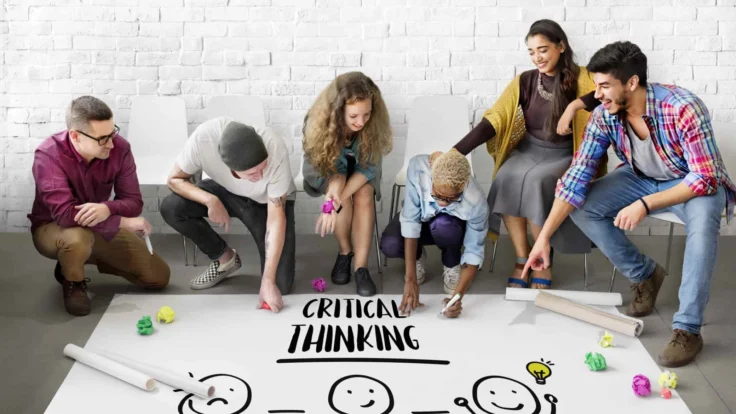- What Is the Meaning of Critical Thinking?
- How To Be a Critical Thinker
- Why Must You Have Critical Thinking Skills?
- How To Include Critical Thinking in a Resume
- Critical Thinking Examples During an Interview
- Top 5 Most Important Critical Thinking Skills
- Common Challenges in Developing Critical Thinking Skills
You probably heard the sentence “put on your thinking cap” a lot when you were in elementary school.
While if someone said that to you as an adult, you probably would feel a bit offended, it is important to be able to sit back and analyze a problem and come to a solution.
Critical thinking is a great skill to have in life and the workplace.
Using a resume builder can significantly improve the way you integrate critical thinking skills into your resume by guiding you to effectively present these abilities with the right structure, action verbs, and keywords. ResumeCoach’s online tool incorporates an AI skills generator to assist you on this task.
By reading this guide you can understand what critical thinking is, how to include your skills in a job application, and have a look at some critical thinking skills examples.
What Is the Meaning of Critical Thinking?
Critical thinking is a way of analyzing data that helps you to solve problems and make good decisions.
The meaning of critical thinking has to do with analyzing information by considering the validity of your ideas, opinions, and conclusions.
This type of analytical skill is necessary for you to take your ideas and opinions, and determine if they are valid.
With critical thinking skills, you will be able to make better decisions and improve your problem-solving skills.
Critical thinkers use evidence found through research or experience to support or disprove ideas rather than accepting them at face value.
Critical thinkers do not blindly accept claims as true just because someone says so; instead, they evaluate whether those claims might be true based on the evidence available at hand (or should I say “online”).
They ask themselves questions like:
- What makes me believe this?cIs there another way of looking at this situation?
- Does this argument really hold water when examined from multiple viewpoints simultaneously?
- Is there any reason why someone would lie about these facts?
Critical thinking helps you to know what is the truth or correct answer because it means that you will be able to ask the right questions and analyze solutions.
Being able to harness these analytical skills can help you as an employee in various job positions and professions.
When discussing critical thinking as a job skill, hiring managers love to see a candidate who can use these skills in the workplace.
Looking at some resume examples can show you exactly how to present those skills to a potential employer.
How To Be a Critical Thinker
It is possible to become a more critical thinker. This type of skill can be learned and improved over time.
It’s not an innate ability you’re either born with or not; rather, it’s a process of evaluation that you can improve over time.
Of course, one important thing you will need is patience! This is a very significant part of learning how to become a better thinker.
You may find yourself having trouble catching on at first; there are no shortcuts here!
You may not be a natural, but stick with it. Many people trying to learn how to think more analytically feel frustrated when they first start learning new skills like these.
Your hard work will pay off over time as once-difficult tasks become easier and easier for you until eventually everything clicks into place and starts making sense.
The steps below will help you become a developed critical thinker.
💡Top Insight
The California Critical Thinking Skills Test (CCTST) indicates a statistically significant increase in overall critical thinking scores when comparing scores from 2012 to 2019 in college students. This means an increase from 15.33 to 16.73. This improvement highlights that critical thinking is something you can train!
Critical Thinking Steps
To think critically takes a process. By going through these steps when you have a problem you will be able to resolve your dilemma correctly.
When at work, this is especially important. When you go through the correct problem-solving steps one by one, you will be able to complete all the tasks your employer gives you.
Here is what you should do when using your critical thinking skills to resolve a problem:
- Determine the problem or dilemma: Be as specific as possible, and figure out why the problem exists, that way it will be simpler to find the solution.
- Gather details or data: Find stats or information from various sources related to the problem you are trying to solve.
- Review the data: Go over the information you have collected, organize it, and make sure it’s from a credible source and that you have enough to make an informed decision.
- Rank the data: List the information you have gathered from the most significant and relevant to the least significant.
- Create solutions to the problem: Test various solutions then go over the results.
- Analyze the solutions you have found: Review the results of your possible solutions to your dilemma.
- Improve your work: Find ways to improve your test results.
- Choose your answer and communicate: Once you have found the answer to the problem, you must then present it to your team and manager in detail.
By following these steps you can come to a reasonable answer to almost any task you are given at work, and improve upon a problem your company is facing.
If you can give some examples on a resume that demonstrate using this process, hiring managers will be calling you in no time for an interview.
Once you’ve mastered these steps, a resume builder can help you articulate them effectively on your resume by turning your problem-solving experiences into polished and professional bullet points.
5 ways to improve critical thinking
Improving your critical thinking skills requires practice, patience, and a willingness to challenge your thought processes.
If you’re wondering how to improve your critical thinking skills, here are 5 practical ways to enhance your ability to analyze, evaluate, and solve problems effectively.
1. Ask questions
Cultivate curiosity by questioning assumptions, ideas, and conclusions. Instead of accepting information at face value, ask yourself: What evidence supports this? Are there alternative perspectives?
This habit helps you dig deeper and develop a more nuanced understanding of issues.
2. Engage in active listening
Pay close attention to what others are saying without interrupting or forming judgments too quickly.
Active listening allows you to fully understand different viewpoints, which is essential for evaluating arguments and making informed decisions.
3. Practice problem-solving
Take on challenges that require you to think critically, such as puzzles, strategy games, or real-world scenarios at work.
By actively solving problems, you can refine your ability to analyze data, identify patterns, and develop creative solutions.
4. Reflect on your decisions
After making a decision or solving a problem, take time to reflect on the process. Consider what worked well, what didn’t, and how you could improve next time.
This self-assessment helps you learn from experience and strengthen your critical thinking over time.
5. Expand your knowledge base
Broaden your understanding by reading diverse materials, attending workshops, or engaging in discussions with people from different backgrounds.
The more knowledge you have, the better equipped you’ll be to analyze complex issues and draw informed conclusions.
Why Must You Have Critical Thinking Skills?
Critical thinking is a skill that is valuable to any professional in just about any field.
It is necessary for developing effective strategies, making wise decisions, and solving problems that an individual or a company has.
Critical thinking allows you to know how to look for an improved solution when faced with a problem or situation.
It is not only essential in the workplace, but in your daily life as well.
You should analyze information coming from sources such as social media or the news to figure out what is true and what isn’t.
As such, it’s one of the best skills you can develop if you want to improve your overall way of thinking.
Critical thinking allows us to see things from multiple perspectives – which enables us to find solutions that work for everyone involved in an issue instead of just ourselves.
This makes it easier for people who disagree on important issues because they’re able to get past disagreements by focusing on what’s best overall.
By doing this you and other people you work or live with can go over data and information together to come to the best solution to a problem or issue.
Strictly applying that logic to the workplace, completing tasks with a group or on your own becomes much easier.
Just make sure you use a resume template, so you don’t make silly errors when presenting your critical thinking skills on your job application.
How To Include Critical Thinking in a Resume
To validate your critical thinking and problem-solving skills to a hiring manager is to place them correctly on a resume.
However, if you choose the wrong resume format there’s a good chance your job application ends up with a rejection.
To make your critical thinking skills stand out on your resume here are a few things you must do:
- List your skills.
- Explain how you used your skills in a previous job.
- Describe a problem you faced, and then explain what steps you took to solve it.
A good list of critical thinking skills to put on your resume include:
- Communication
- Observation
- Analysis
- Problem-solving
It’s essential not only to list that you have critical thinking skills, problem-solving skills, or analytical skills, but you also are going to have to back up your list with real examples.
Below are examples of what you should and shouldn’t put on a resume when providing proof of your critical thinking skills in past job descriptions.
Wrong ❌
When working as a nurse, I always selected the best treatment for the patients.
This example shows that a solution had been found, in this case, treatment. However, it does not explain how the answer was found and what was done with these findings.
Right ✅
After reviewing analysis from present cases, I determined the best treatment option for the patient. I then explained my logic and findings to the rest of the medical staff.
This example displays that a solution was found based on analysis. Afterward, the findings were communicated to the other staff members.
These are all parts of the critical thinking and problem-solving process, and presenting an example like this on your resume will impress a hiring manager.
Wrong ❌
Handled customer complaints effectively.
This example of someone who works in customer service is missing a lot of essential information on their resume.
It does not show how they handled complaints effectively, or if there was an improvement.
Right ✅
Studied the responses to customer surveys to create an improved strategy for dealing with customer complaints.
This is a fantastic way to explain what you did while working at your previous job. It shows that you used the necessary problem-solving steps and created a solution that improved productivity.
Coming up with a description like this for one of your past jobs will surely grab a hiring manager’s attention.
Using a resume builder can simplify this process by guiding you in listing your critical thinking skills, crafting impactful descriptions, and avoiding formatting errors that might distract hiring managers.
Critical Thinking Examples During an Interview
If you write your resume and cover letter correctly, you will almost certainly get called in for a job interview.
When that time comes, it will be critical for you to know exactly what you should say when you need to show off your critical thinking skills.
You need to be ready for any question that could come up during the interview.
Here are some common interview questions that will test your critical thinking experience.
Question: Describe a moment you realized there was a problem at work, and then solved it.
Answer: “Our group had to meet a new deadline to finish the creation of our product. I listed our tasks, then ranked them by priority, and communicated with the group to discuss who would complete a task or tasks. We met the new deadline with our product.”
This example shows both evaluation and problem-solving when presented with an issue.
Question: Describe a situation when you had to convince someone to take your advice.
Answer: “The owner was sure we were making enough money with our bike tours. I analyzed our income and saw we were at a 15% deficit. I then created a presentation showing answers to customer surveys that proved we could increase our revenue by changing the route of our tour.”
By including an answer like this, you demonstrate your analytical skills and show you know how to communicate your findings.
When you can demonstrate these traits in your resume and during your job interview, it will be extremely difficult for a hiring manager to turn you down.
Top 5 Most Important Critical Thinking Skills
The all-important question is, what are the critical thinking skills that you must have in the skill section of your resume?
You probably can think of some critical thinking examples in real life if you try hard enough.
However, it would be ideal to include skills you have used exclusively on the job to solve problems and increase productivity or earnings.
By understanding what these skills are, you’ll grasp what a hiring manager values in an employee who is a great critical thinker.
1. Observation skills
A hiring manager would love to have someone that has great observation skills. With this type of skill, you can identify a problem, and then quickly create a solution.
If your observation skills are good enough, you can probably see an issue before it even begins to negatively affect a business.
2. Inference skills
This is a skill that has to do with taking data and information you have gathered and then drawing the correct conclusion based on that information.
You can base answers on limited details, and that talent can be used in many professional settings.
3. Analytical skills
You don’t need to be a scientist or a mathematician to be great at analyzing situations. Being able to evaluate a situation to find solutions to problems at work.
Hiring managers love employees who possess analytical skills, especially when considering who can be a team leader.
4. Communication skills
Communicating your findings and ideas is essential to any company. Whether you are discussing data and solutions with your boss or coworkers, you need to know how to communicate.
Make sure you always listen as well as speak, part of being a great critical thinker is to listen to the opinions of others.
5. Problem-solving skills
This is arguably the most important concept of being a critical thinker. It’s not enough to be able to analyze data and information.
It is also essential that you can come up with solutions. An employer wants someone who can improve their company, and being a great problem solver allows you to do just that.
Other notable critical thinking skills
Critical thinking encompasses a wide range of abilities that help individuals analyze, evaluate, and solve problems effectively.
Below are 15 additional critical thinking skills you should consider:
- Adapting to new information
- Assessing risks
- Brainstorming solutions
- Building logical arguments
- Categorizing data
- Conducting experiments
- Creating hypotheses
- Detecting inconsistencies
- Developing contingency plans
- Drawing inferences
- Examining evidence
- Generating alternatives
- Prioritizing tasks
- Recognizing patterns
- Troubleshooting errors
Common Challenges in Developing Critical Thinking Skills
Developing strong critical thinking skills can be challenging, as it requires consistent effort and self-awareness.
Below are some common obstacles people face and practical solutions to overcome them:
- Confirmation bias: A tendency to favor information that supports pre-existing beliefs can limit your ability to think critically. Actively seek out opposing viewpoints and evaluate them objectively.
- Lack of information: Making decisions without sufficient data can lead to flawed conclusions. Gather comprehensive and reliable information before forming judgments.
- Overconfidence: Overestimating your abilities can prevent you from questioning assumptions. Practice humility by acknowledging gaps in your understanding.
- Emotional influence: Letting emotions cloud judgment can hinder logical thinking. Take a step back and assess situations calmly before making decisions.
- Time pressure: Rushing decisions under tight deadlines can lead to errors. Allocate time for thorough analysis and reflection.
By recognizing these challenges and implementing strategies to address them, you can improve your critical thinking abilities and make better-informed decisions in both your personal and professional life.
Related Posts




